We're an affiliate
We hope you love the products we recommend! Just so you know, we may collect a share of sales or other compensation from the links on this page at no additional cost to you. Thank you if you use our links, we really appreciate it!
You’re going about your day, doing chores and other things around the house, then you look down and see a puddle of urine. Your dog must have just peed on the floor!
You clean it up, but then another puddle appears later that day, or maybe even the next day. Why is my dog suddenly peeing in the house?
It can be frustrating to see your potty-trained dog suddenly peeing in the house. There must be a reason for this, which sometimes can be medical, and so you need to get to the bottom of it.
In this post, we unpack some common scenarios that may cause your typically house-trained pup to create a mess within the house. Stay tuned to learn the steps you can take to correct this behavior.
Why Do Dogs Pee in The House?
Here are some of the most common reasons for house soiling in dogs:
- Drinking too much water
- Eating too much wet foods
- Urine marking
- They are not house-trained
- Anxiety/Nervousness
- Behavioral problems
- Medical conditions
- To get attention
- Old age
- Submissive urination
Why Is My Dog Suddenly Peeing in The House?
Your dog could suddenly shift from the normal and start going inside based on some of the reasons highlighted below:
1. Medical Conditions
An abrupt change in your pup’s behavior may indicate a health problem that has to be addressed. Take your affected dog to the vet right away to get examined for possible diseases that may be taking a toll on them.
Urinary Tract Diseases are the leading causes of medically-caused house soiling in dogs. These issues include cystitis, crystals in the urine, urinary tract stones, cancer, infections, structural tumors, or abnormalities
Your dog might get an infection in the urinary tract when they get exposed to bacteria in the urethra.
UTIs cause inflammation and pain along the urethra making it difficult for your dog to urinate normally.
Symptoms of urinary tract diseases in dogs include:
- Straining or whining when peeing.
- Dripping urine
- Cloudy urine
- Blood in urine
- They’re suddenly walking around more often than usual
- Frequent urination
- Smelly urine
Most urinary tract issues in dogs are treatable by simple medication, dietary supplements, or diet changes, while some issues like bladder stones might require surgical procedures.
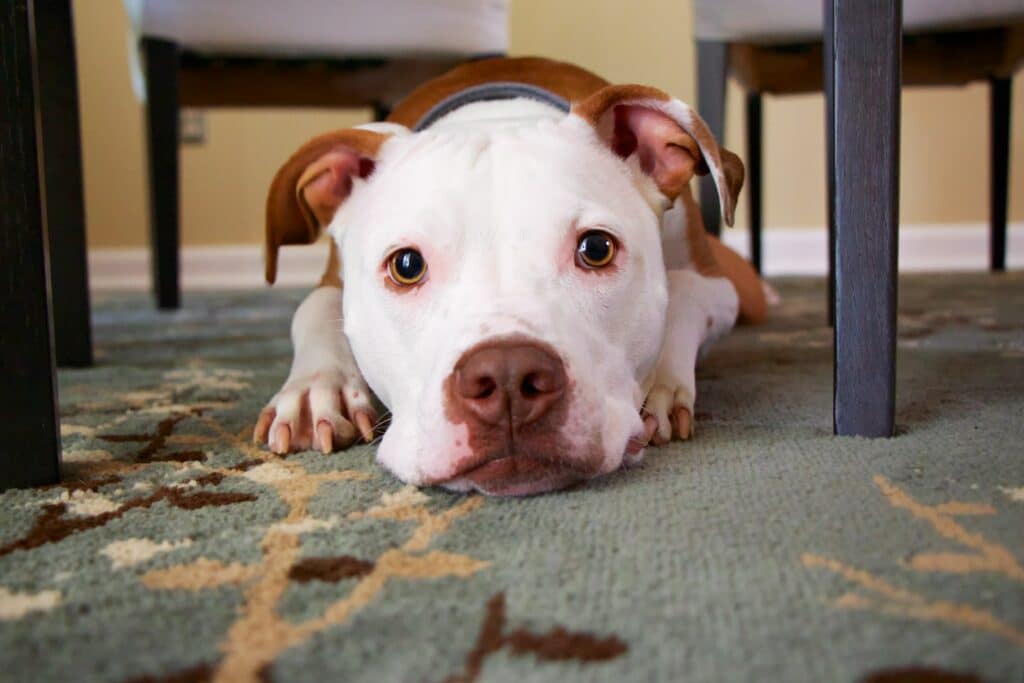
Urinary incontinence is another health problem in dogs that could make them involuntarily pass urine. This problem is not reserved for old dogs alone as it could also affect your younger pup.
You can suspect if your dog is suffering from this condition if they infrequently pass small puddles of urine when they sit or sleep.
Incontinent dogs have no control of their bladder and so they don’t know they are passing urine. But the good news is that the condition can be handled with medication.
Arthritis in elderly dogs might also cause house soiling. This health condition inflames the dog’s joints making them nearly incapable of standing and walking around for their potty breaks.
Instead, the affected dog will just resort to passing urine while seated or while struggling to get their way out of the house.
Among other signs of arthritis in dogs, you can physically look out for stiffness or staleness in your dog’s joints to see if they have this condition.
Other diseases that may cause your dog to have urinary accidents in the house are; kidney diseases, liver diseases, prostate issues, diabetes, and Cushing’s syndrome among others.
2. Medication
Some drugs e.g., corticosteroids will make your dog have increased thirst and urination which can go overboard.
These drugs weaken your dog’s body and they may make them go inside involuntarily. Your vet will always give you all the expected side effects when prescribing drugs to your dog.
3. Marking Territory
Dogs use their urine to leave a territorial mark to assert their dominance over other dogs. This will often occur when you bring a new pet to your home and the resident one tries to affirm ‘who’s the boss here’.
Moving houses or outdoor disturbances may also make your dog mark the new territory.
They will usually do this by urinating on items that are near their bedding, like your door or window frames, or objects in your home such as toys or shoes. Neutering your male dog can help to solve this situation.
4. Separation anxiety
Your dog may start peeing in an attempt to communicate their need for your presence. This can happen when your dog is left alone for long periods and they require your company either for fun, or they just need to feel safe.
Other signs of separation anxiety in dogs include barking, destructive chewing, digging, pacing, or escaping.
5. Stress or fear
A fearful dog may resort to inappropriate elimination of urine around the house, and chewing of items among other things.
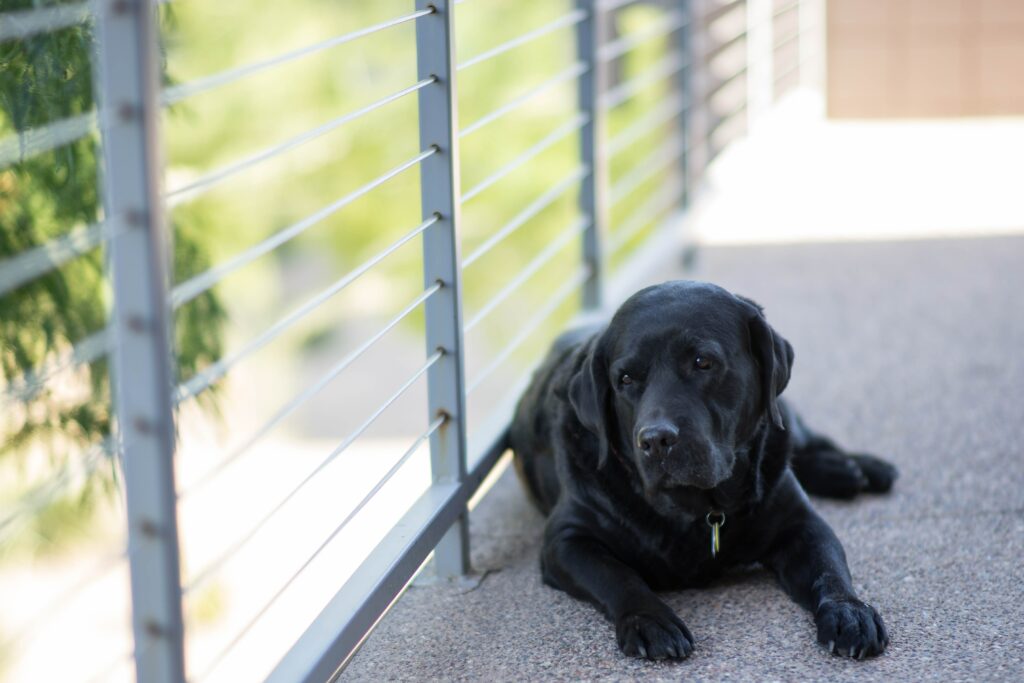
Your dog could be scared of anything that makes them feel unsafe including loud noise or sudden movements within the house.
6. Old age
As dogs get elderly, they are prone to develop cognitive issues such as canine dementia and senility. This will affect your pup’s intellectual reasoning and they may urinate inappropriately around the house.
You can know if your elderly dog is suffering from dementia when they show signs of confusion and disorientation.
They may miss their steps when going up the stairs, or even forget the route back to your home after their routine walk.
Dogs suffering from other neurological conditions may also lose control of their bladder and may urinate in the house.
7. They were not fully potty-trained
Your pooch may be back to peeing in the house because the house-training sessions were not complete.
You might have rushed things during the training or missed some steps and the pup is finding it easier to pee within the house now that you are not ‘assisting’ them.
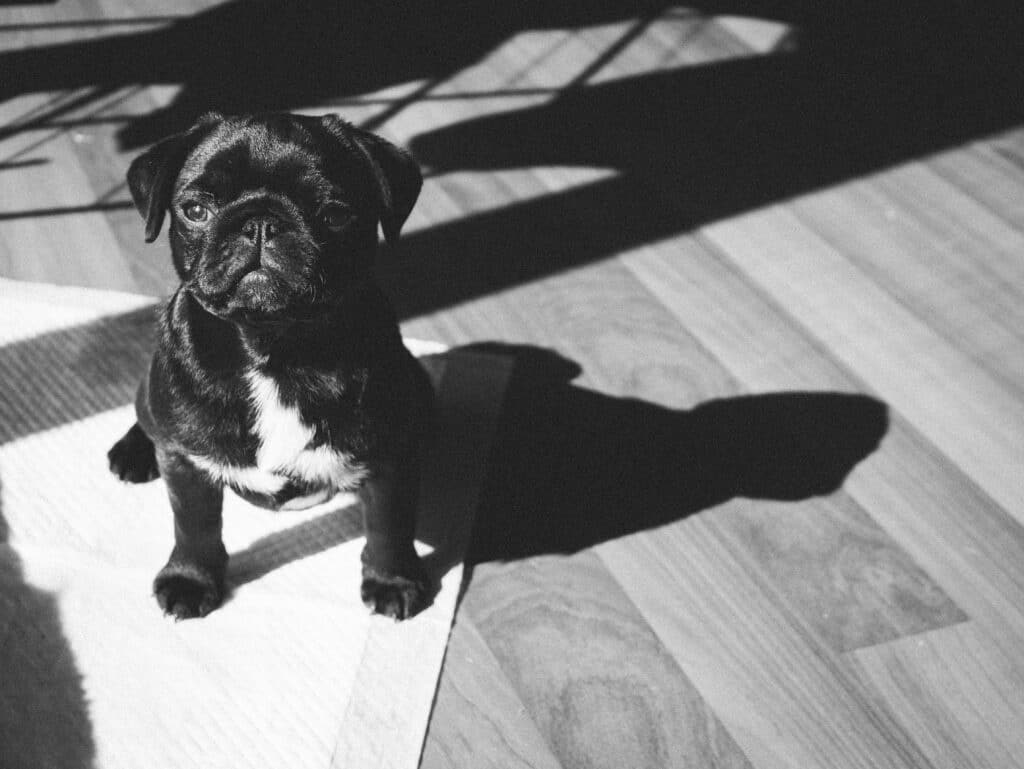
Setbacks in house training may also happen when you introduce a new pet in the family or make an abrupt change in the home layout.
You can kickstart your training journey today by reading our comprehensive guide on how to potty train a puppy.
8. Change of their environment
Changes in the surroundings that your dog was previously familiar with can lead to a disruption in their routine which includes accidental urination.
Such disruptions might include minor changes like swapping furniture within the house or major shifts like moving houses.
A new family member/guest could also alter how your dog behaves which might significantly mess up their known routine
Also, when you abruptly adjust your dog’s daily sleeping and napping time, they become prone to miss out on what they are expected to do.
9. Harsh weather
Sometimes during harsh weather conditions, your dog might be reluctant to take a walk to the yard for their potty breaks. Instead, they just resort to relieving themselves in the house.
This is most likely to happen during the winter or summer when the dog might be overwhelmed by the intolerant cold or heat.
How To Stop a Dog from Peeing in The House
If your furry friend has made an accident in the house suddenly, you should not punish them for doing so. You should however go back to the basics and try to address the fundamental issues.
Punishing your dog for mistakes will only make the problem worse because dogs are not likely to associate negative conduct with punishment.
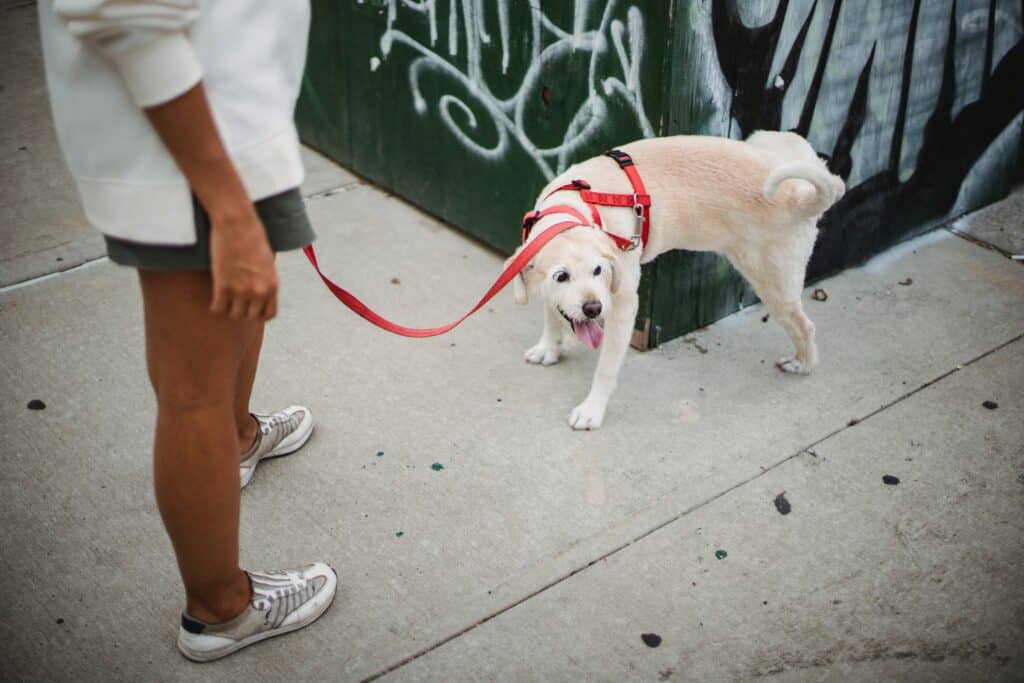
You should instead focus on positive reinforcement by rewarding your dog every time they pee in the right place.
Here are some of the things you can do:
1. Visit the vet
If your house-trained dog is suddenly doing the opposite, it is important to take them to the vet right away to rule out any medical causes.
You can carry along a sample of your dog’s urine for examination and analysis.
If your vet found no medical cause, then you should figure out what other things have affected them.
2. Clean your dog’s mess right away
You should always try to clear your dog’s urine immediately to avoid leaving a persistent smell over the area.
Your furry friend can easily mess up again in an area where they can smell their urine. This might lead them to think it’s a good thing and they will develop an unwanted habit.
If you want to deal with tough odors, you should use an enzymatic cleaner that breaks down the bad smell.
Go for a pet odor eliminator that is designed to remove urine odor, then allow the area to air out before bringing your dog back inside.
If your dog messes on the carpet, then we recommend that you use a carpet cleaner that will remove all the stains and germs from your surface while maintaining the fabric.
3. Change their diet
If you are giving your dog wet foods only, then you might want to mix it with some dry kibbles.
Make sure not to let your dog or puppy drink too much water by keeping an eye on how much they consume.
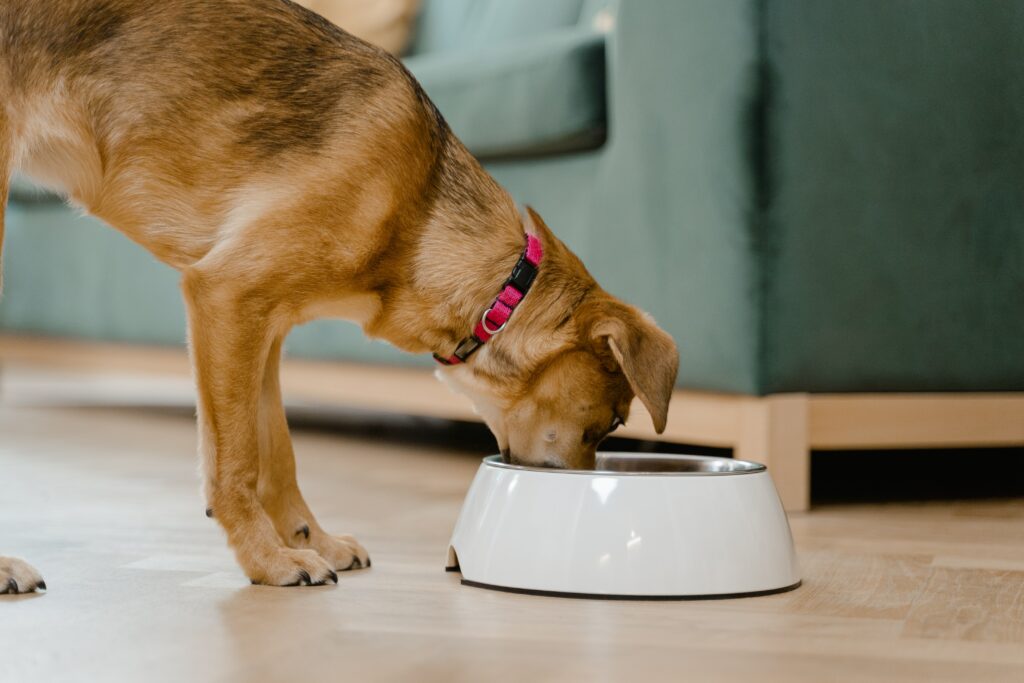
If you are storing your dog’s food where they can access it, you should try putting it away in a locked cabinet or cupboard.
Even when changing your pup’s diet, make sure to give them a well-balanced diet to keep them healthy and strong.
4. Feed your dog at specific times
This will help them to create a habit and they can now predict when to walk outside for a bathroom break.
You need to know how long your dog can hold pee and match that with consistent and regular feeding hours. This will hence prepare you to monitor their potty breaks and for a timely clean-up process.
5. Retrain your dog
You might have missed some important steps when house-training your puppy and that is why they are back to square one.
A natural way to stop dogs from peeing in the house is by training them on how to use a pee pad.
Do not rush the process, your dog might require more time in training than others. Focus on what your Fido is doing right then praise and reward them for that.
6. Seek professional help
If you’ve tried everything and your dog seems not to stop going in the house, you should consider getting them some professional help from a canine specialist or animal behaviorist.
They will help you to handle some of the problems that are listed in this article and make life easier for you and your dog.
Alternatively, you can learn how to train your dog using this online dog training eBook. It’s very comprehensive and goes over every dog training, from obedience to teaching your dog a few tricks.
Use the code BRAINYDOG to get a 10% discount at checkout. You even get a 60-day money-back guarantee if you are not satisfied with the training material.
Submissive Urination & Behavioral Peeing in Dogs
Dogs are pack animals and they are always expected to show submission to their leader to avoid scuffles. While in their pack, the less dominant dogs would always roll around the alpha dog and urinate in submission.
Dogs have carried this behavior to their human family and will sometimes urinate in response to fear or submission to your authority.
This is a way the dog uses to pass the message that they are giving in to the person and they don’t pose any threat.
The submissive dog will always show other signs alongside urination which can include lying down, tail tucking, looking sideways, or rolling over with their back.
There are several things that can cause submissive urination, such as meeting new people or animals, loud noises, or changes in their environment.
Submissive urination is a common behavior in puppies but they usually mature out of it as they become adults.
Adult dogs who have experienced violence, physical abuse, and accidents might show submissive urination even when not in any danger.
Behavioral or excitement peeing is however different where some dogs may urinate when they are overly excited or happy.
This usually occurs when the dog meets the owner after a while or when a visitor says ‘hello’ to them.
Dogs with ‘happy urination’ will not show other signs of being submissive, they may only wag their tail and jump over the person.
Frequently Asked Questions
1. Do dogs pee to get attention?
Yes, sometimes dogs can pee to get our attention. Dogs are social creatures and they love to be around people and other pets. They will often do whatever it takes to get their owners’ notice and this includes both direct and indirect ways.
They will try several things which include: barking, looking at you with open eyes, and leaning in close to grab attention.
They may also try indirect ways which include: licking, pawing at you, or peeing on something you care about so that you notice them and become concerned about the urine.
Dogs who do this have most certainly learned the behavior. They know that by passing out urine, you will most likely come by and check on them.
2. How long does it take for behavioral peeing in dogs to resolve?
Puppies are more susceptible to behavioral peeing but they usually outgrow this habit. Most puppies will correct this behavior by the time they are 1 year old without training.
All dogs are different and so your dog might continue with this behavior for a while before they stop it.
3. What is the best way to clean dog pee?
If you leave your dog’s pee on a messed surface it may host some germs and bacteria which can be hazardous for both the pets and the human family.
The best way to clean up your dog’s mess is to use a solution that will completely disintegrate the molecules leaving no germs, smell, or stains.
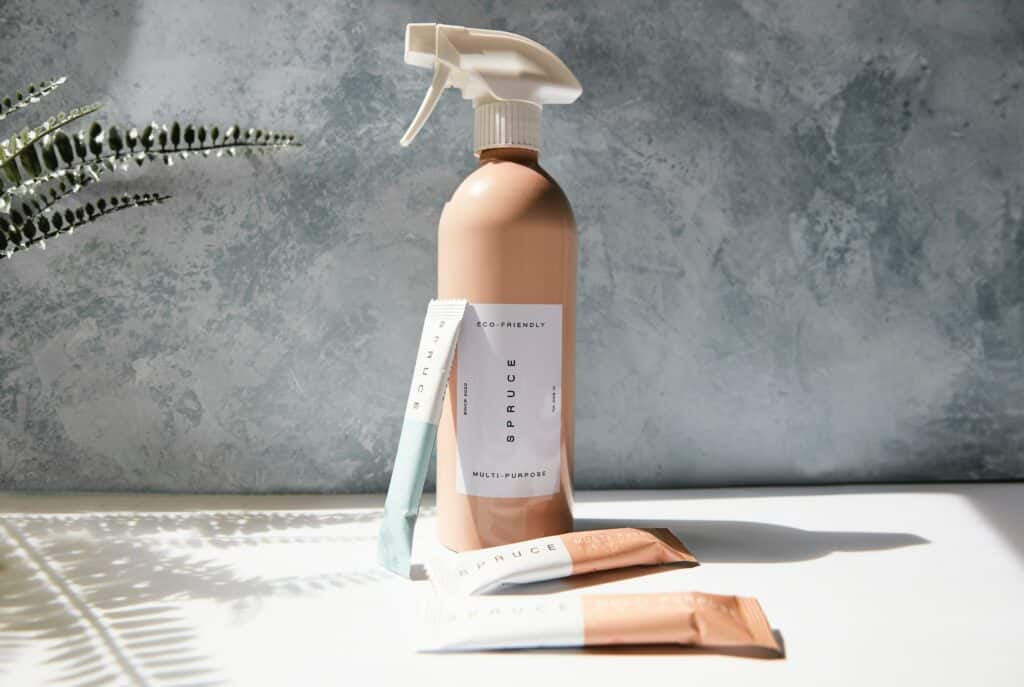
We recommend using a white vinegar solution and baking soda (sodium bicarbonate) for the best results. Vinegar has powerful cleaning properties that will kill germs and remove stains, making it the best choice for cleaning up dog pee.
Mix an equal part of the vinegar solution with clean water (1 cup) and add 2 tablespoons of baking soda. Shake the mixture well and put it in a spray bottle.
Spray the solution on the stained surface and let it sit for about 5 minutes then scrub with a soft brush and then use a wet wipe or paper towels to wipe off the area.
Conclusion
Why is my dog suddenly peeing in the house? It could be a medical condition, a behavioral problem, or caused by a shift from what your dog was used to.
The most important thing is to figure out what has caused your dog to have a leak inside and we recommend ruling out the health problems first.
Remember not to scold your dog for making urinary accidents and instead, focus on rewarding good behavior. Just be patient enough to retrain your dog on the right way to follow.
Laura is the founder of Furs'n'Paws. She is a also a pet writer and expert with more than 20 years of experience of working with dogs and cats. She developed a very strong love for animals at a young age. Her passion led her to establish a thriving pet sitting and dog walking business in Dubai. As an expert in pet training, behavior, and nutrition, Laura is committed to helping pet owners and pet lovers by offering high-quality information on a wide range of topics.


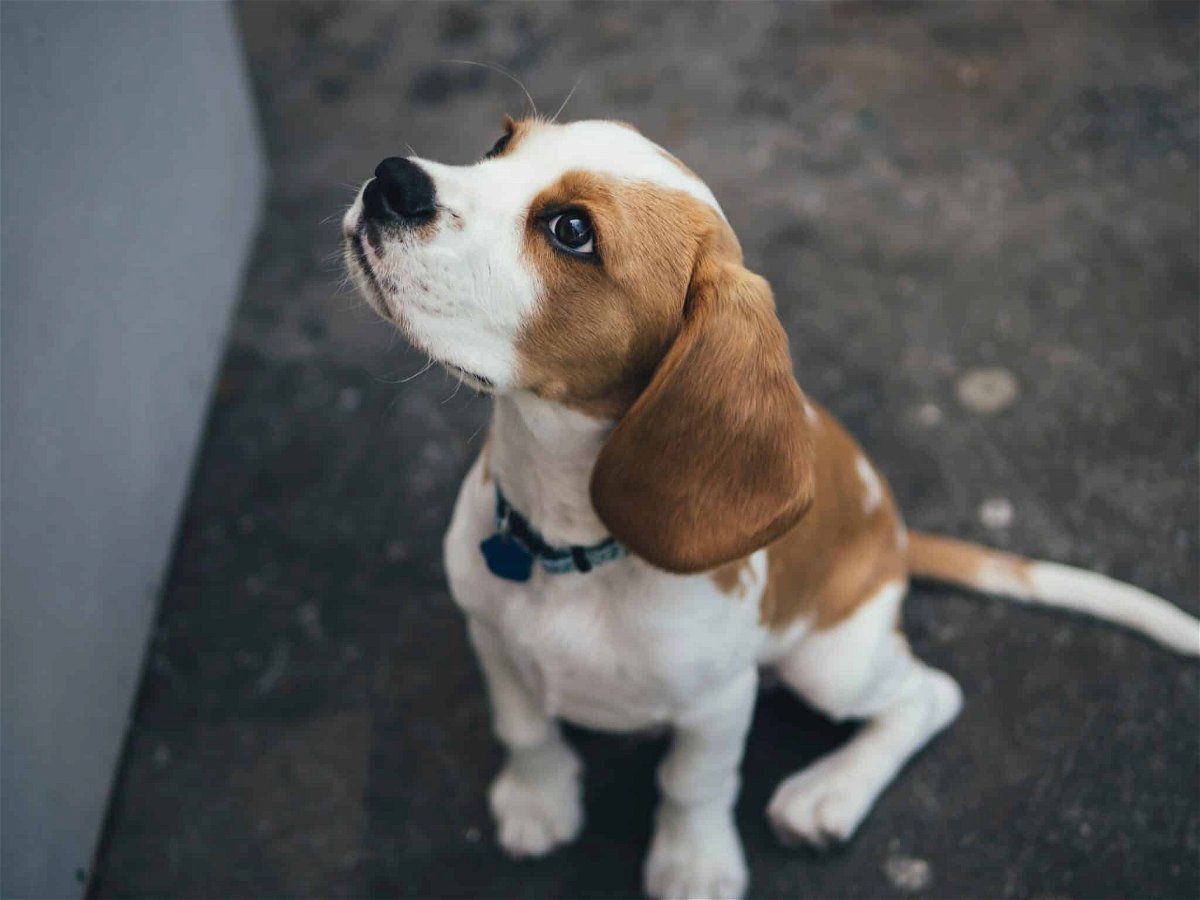
No responses yet